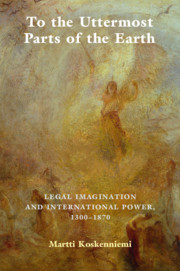Book contents
- To the Uttermost Parts of the Earth
- To the Uttermost Parts of the Earth
- Copyright page
- Dedication
- Contents
- Acknowledgements
- Introduction
- Part I Towards the Rule of Law
- Part II France: Law, Sovereignty and Revolution
- Part III Britain: Laws and Markets
- 8 The Law and Economics of State-Building
- 9 “Giving Law to the World”
- 10 Global Law
- Part IV Germany: Law, Government, Freedom
- Bibliography
- Index
9 - “Giving Law to the World”
England c. 1635–c. 1830
from Part III - Britain: Laws and Markets
Published online by Cambridge University Press: 05 August 2021
- To the Uttermost Parts of the Earth
- To the Uttermost Parts of the Earth
- Copyright page
- Dedication
- Contents
- Acknowledgements
- Introduction
- Part I Towards the Rule of Law
- Part II France: Law, Sovereignty and Revolution
- Part III Britain: Laws and Markets
- 8 The Law and Economics of State-Building
- 9 “Giving Law to the World”
- 10 Global Law
- Part IV Germany: Law, Government, Freedom
- Bibliography
- Index
Summary
England’s commercial expansion in the late 17th and 18th centuries was based on its navigation laws that reserved maritime carrying trade to British operators. Massive use of privateers and imposition of rules of neutrality in maritime war effectively destroyed the ability of Britain’s enemies (Spain, Netherlands and France) to profit from their colonies or long-distance trade. The union of private interest and sovereign policies that underlay Britain’s rise was theorised by David Hume and Adam Smith: private actors knew best where sources of profit could be found in a theory of commercial society that recast the state as facilitator of private investment. Benthamite utilitarianism proposed to do away with the view that modern government had anything to do with natural rights or other abstractions. Empiricism, the predominance of political economy and the authoritarianism of British government in the 1830s were summarised in John Austin’s theory of sovereignty and relegation of international law into private morality. Until the mid-19th century, there was virtually no space in the British world for imaginative thinking about the law of nations.
- Type
- Chapter
- Information
- To the Uttermost Parts of the EarthLegal Imagination and International Power 1300–1870, pp. 622 - 698Publisher: Cambridge University PressPrint publication year: 2021



